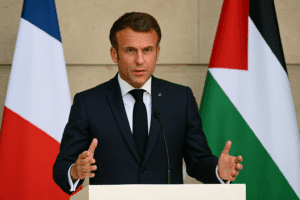France’s Bold Gambit: Recognizing Palestine and the Global Rift It Exposes
France’s decision to recognize Palestine marks a historic pivot in global diplomacy, positioning President Macron as a bold outlier among Western leaders. Frustrated by stalled peace efforts and pressured by domestic outrage over the Gaza crisis, Macron aims to revive the two-state solution and challenge the U.S.-Israeli status quo. His announcement, timed ahead of the September UN General Assembly, seeks to galvanize support from other European nations and the Global South.
Israel has reacted angrily, accusing France of legitimizing terrorism, while the U.S. condemned the move as damaging to regional stability. This recognition doesn’t grant Palestine full statehood but offers powerful symbolic leverage. France’s gamble exposes widening rifts within the West and signals shifting alliances in the Middle East. Macron’s strategy is as much about global leadership as it is about justice—forcing allies to confront their contradictions. In doing so, he redefines the boundaries of Western consensus on Israel and Palestine.

France’s Bold Gambit: Recognizing Palestine and the Global Rift It Exposes
Why Macron’s UN Announcement Is More Than Symbolism
In a move that ignited diplomatic shockwaves, French President Emmanuel Macron declared on July 24th that France will formally recognize Palestine as a state at September’s UN General Assembly. This positions France as the first major Western power to take this step—a deliberate strategy to “create momentum” for other nations to follow. But beneath the symbolism lies a high-stakes geopolitical chess game exposing deep fractures among allies.
The Core Conflict: Peace Catalyst or Terror Reward?
- France’s Calculus: Macron frames recognition as preserving the “two-state solution” amid Gaza’s devastation. By announcing before a July 28th peace conference, France pressures hesitant partners (like the UK and Canada) to align. Crucially, it signals to the Global South that Western powers can defy U.S.-Israeli dominance on Palestine.
- Israel’s Fury: PM Netanyahu called it a “surrender to terrorism,” asserting a Palestinian state would become “a launch pad to annihilate Israel.” Defense Minister Katz warned of annexation threats in retaliation—hinting at unprecedented bilateral fallout.
- U.S. Backlash: Secretary of State Marco Rubio labeled the move a “slap in the face” to October 7th victims, claiming it “serves Hamas propaganda.” This echoes a June U.S. diplomatic cable opposing unilateral recognition as counter to American interests.
The Unspoken Realities Driving Macron
- Europe’s Domestic Pressures: With Europe’s largest Muslim and Jewish communities, France balances rising public outrage over Gaza against pro-Israel sentiment. Recognition acts as a pressure valve while positioning France as a moral leader.
- The Failed Conference: A June UN peace summit co-hosted with Saudi Arabia was postponed under U.S. pressure and due to Israel-Iran clashes. Macron’s unilateral pivot reveals frustration with diplomatic gridlock.
- Canada’s Middle Ground: While condemning Israel’s “violation of international law” over blocked aid, PM Carney still backed a two-state solution—highlighting allies’ struggle to reconcile criticism with policy.
Why Timing Matters More Than the Act Itself
Recognition changes little on the ground: Palestine lacks defined borders, unified governance, or security guarantees. But Macron’s September UN stage transforms it into a catalyst for collective action. If Spain, Ireland, or Norway join—as diplomats suggest—it could isolate the U.S. and Israel, forcing a reckoning with the long-eroded two-state framework.
The Road Ahead: Risks and Reshaped Alliances
- Israel may retaliate by limiting intelligence sharing or advancing West Bank annexation.
- The U.S. faces mounting pressure as its “unshakable ally” stance clashes with global opinion.
- For Palestinians, recognition is psychological leverage but falls short of ending occupation or Hamas-Israel strife.
Macron’s gamble isn’t just about Palestine—it’s a challenge to a U.S.-led world order. By forcing allies to pick sides, he exposes a pivotal shift: Western unity on Israel is fracturing, and the quest for peace now demands uncomfortable defiance.
You must be logged in to post a comment.